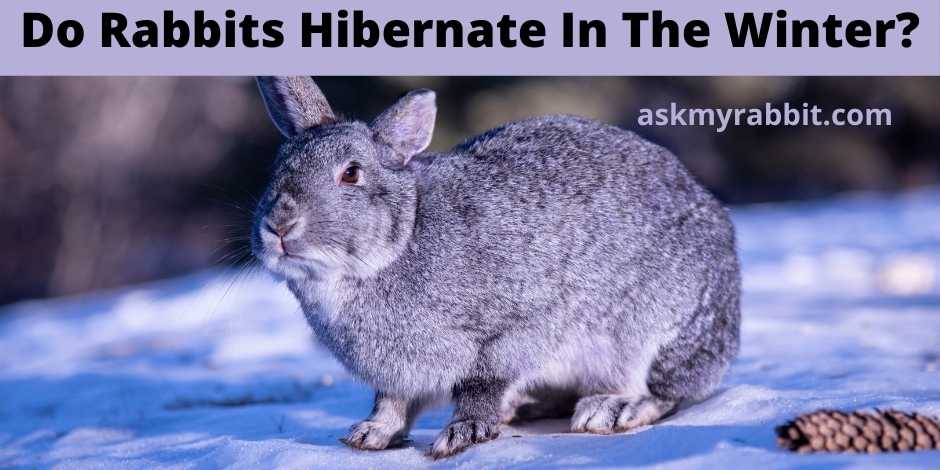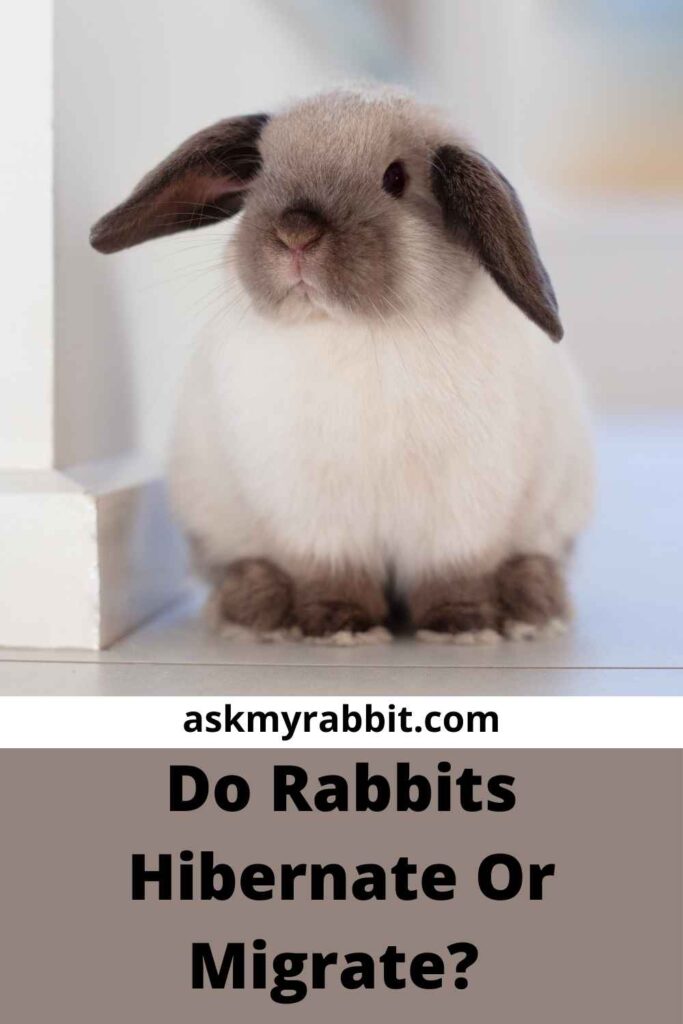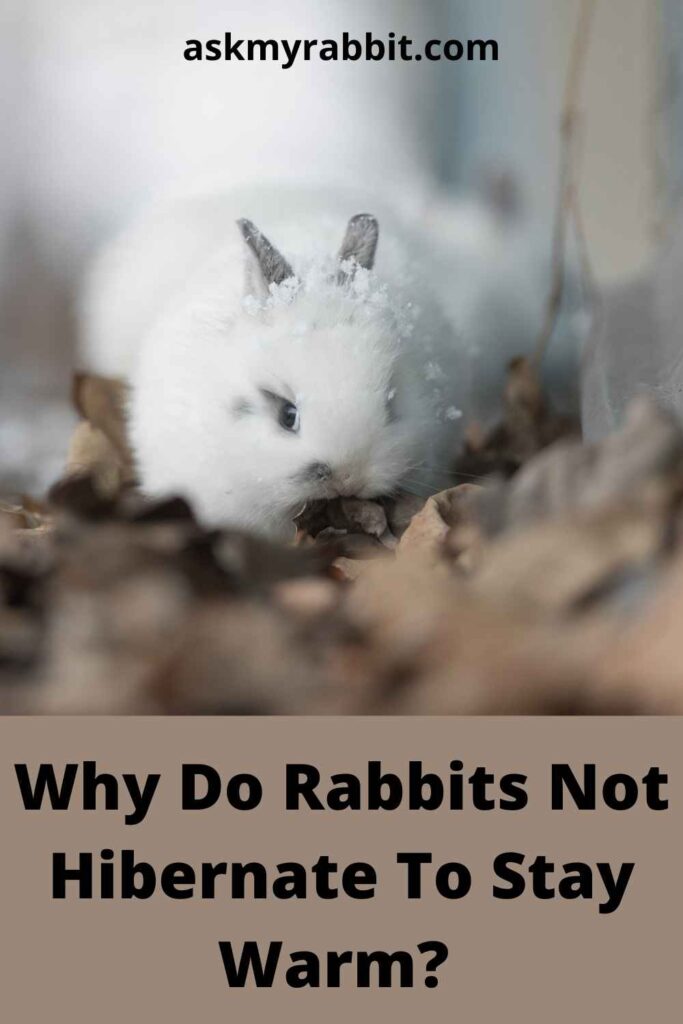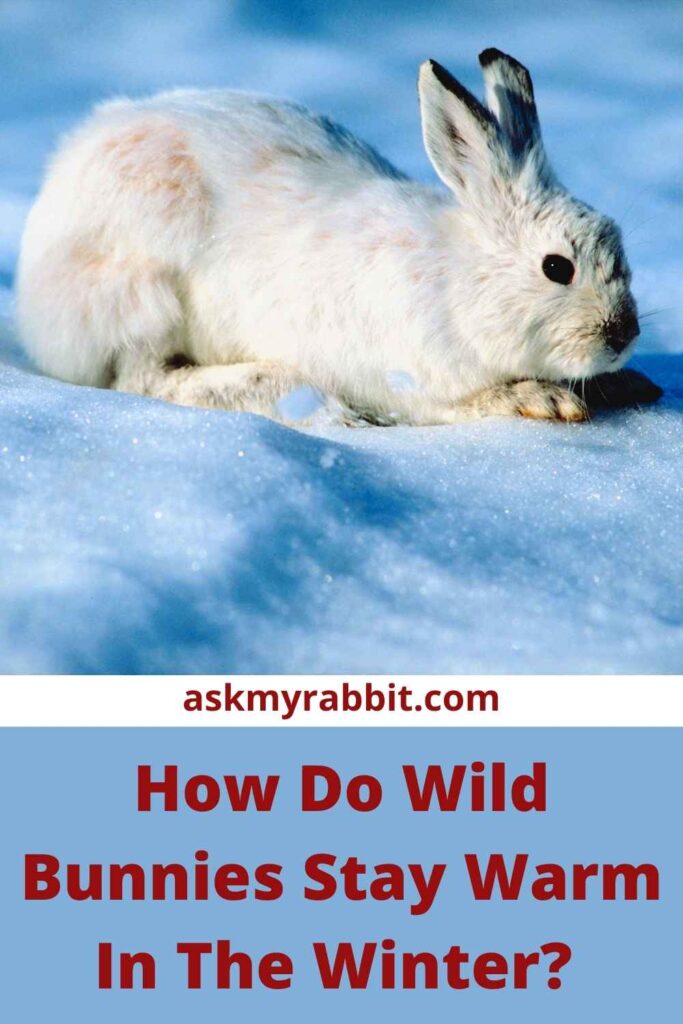If you see rabbits in your yard this winter, it’s most likely because they’ve discovered a tasty food source nearby. These food sources are often green decorative plants that are tall enough to be seen even after winter in most homes. Bunnies are attracted to flaming bush plants, tall bushes, twigs, bark, and tree buds.
However, you may see rabbits disappearing during winter. This may make you wonder, do rabbits hibernate in winter?
No, rabbits do not hibernate in the winter. Therefore, they are constantly on the lookout for food. Grass and other low-growing plants are the primary food sources for rabbits.
However, when it snows, they generally can’t get to the grass they regularly rely on. They’ll have to be a bit less choosy and a lot more innovative to survive.
If you want to learn more about the lifestyle of bunnies during winter months, keep reading!

Do Rabbits Hibernate Or Migrate?

No, rabbits do not hibernate during the winter or any other season. They are on the lookout for food sources at all times of the year. If you don’t see rabbits in your yard as it gets colder or snows, it’s possible they’ve moved on to a better food source.
Wild rabbits of all kinds don’t travel anywhere other than where they’re supposed to be throughout the winter. Rabbits remain in the same areas as in the spring and summer.
When it becomes really cold, they can be spotted excavating burrows or finding warm spots to relax. They’ll also need to protect themselves from predators. So, they’ll be looking for dense bushes, evergreen trees, or structures to hide behind so they won’t be noticed.
It’s possible that you’re seeing them less in your yard because they’re attempting to avoid the cold or hide from predators.
No, rabbits do not migrate. This will often spend their whole lives in the same region they claim. Normally, the region where they live for the rest of their lives is a few acres in size.
Some animals, such as birds, migrate to find better food and warmer environments. However, this is not the case with our rabbit companions.
Why Do Rabbits Not Hibernate To Stay Warm?

It’s natural to wonder why rabbits don’t hibernate during the winter months. Hibernation causes the body’s functions to slow down, and the animal sleeps for months.
Animals hibernate for a variety of reasons, the most common of which being a lack of food throughout the winter. So it isn’t just due of the cold.
Rabbits may obtain food pretty quickly if they take cover in the right place. As a result, rabbits have no motivation to hibernate. They also have a variety of alternative means of coping with the cold.
The anatomy of rabbits was not built to function with such a slowing in physiological activities. Any slowing in a rabbit’s digestive system can quickly put the animal in danger. Hibernation is incompatible with a rabbit’s lifestyle due to its continuously moving digestive tract and high fibre diet.
Rabbits are likewise unable to operate when their body temperature falls below a certain threshold.
When their body temperature drops to hundred degrees Fahrenheit, they are in the early stages of hypothermia. The bodies of rabbits are incapable of controlling themselves at the low temperatures necessary for hibernation.
Where Do Wild Rabbits Go In The Winter?
During the winter, wild rabbits do not migrate or hibernate. They dwell in the same areas they do in the summer. Their activity is largely consistent throughout the year.
If you observe fewer rabbits in the winter, it’s either because the population has decreased or the rabbits are seeking refuge from the cold.
Rabbits can survive in their natural habitats even in very cold locations with a lot of snow. But it doesn’t imply rabbits have it easy in the winter. To have the best chance of survival, they must learn how to make dietary and lifestyle modifications.
Do House Rabbits Hibernate In The Winter?
No, house rabbits do not hibernate in the winter. Regardless of how cold it gets, pet rabbits do not hibernate. They don’t even become lethargic in the winter, and they frequently have more energy than they do in the summer.
During the winter, when owners believe their bunnies are hibernating, indicators of serious sickness are sometimes neglected. Lethargy, loss of appetite, and weight loss are all concerning symptoms during winter. Your rabbit should be taken to the veterinarian right soon if you see any of these.
The cold is preferable to the hot for bunnies. Because you provide shelter and food, they have it easier than wild rabbits.
Are Indoor Rabbits Less Active In Winter?
No, indoor rabbits are not less active in winter. As the weather grows cooler, domestic rabbits become more active and lively. They enjoy the cooler temperatures.
As the weather cools down, you may notice your rabbit zipping about the living room and doing some binkies. Other rabbit activities such as digging and gnawing are also more common among them.
Make sure you’ve rabbit-proofed your home to prevent your bunnies from getting into anything they shouldn’t.
Do Wild Rabbits Hibernate?
No, wild rabbits do not hibernate. Although wild rabbits do not hibernate, their behaviour does shift in the winter. A very different winter diet than a summer one is one of these shifts.
Wild rabbits survive the summer by eating grass, flowers, and vegetables, as well as other plants and weeds. As they do not have access to their favoured warm-weather meals throughout the winter, they must discover new means to live.
They survive the winter by eating food buried in the snow. Tree bark is a major part of their diet. Because there is less foliage for them to hide in during the winter, it’s even simpler to spot them.
How Do Wild Bunnies Stay Warm In The Winter?
Rabbits, unlike several other animals, do not hibernate in the winter to avoid the cold. Instead, a multitude of factors assist them in being comfortable even under extreme conditions.
The following are the ways wild bunnies use to stay warm during winter:

1. Molting and Fur Growth
The majority of rabbits moult once a year. However, some moult twice. Before the winter, they lose their fur and gain a thicker coat.
They can keep warm and hunt for food in this manner, despite the cold. They do, however, shed after the winter. In this example, the dense fur is removed and replaced with a thinner coat.
As a result, they can withstand the heat without becoming overheated or developing skin issues. During this season, almost all rabbits shed.
Most rabbits, on the other hand, do not need to lose their hair in order to develop a thicker coat. Instead, they cover their current coat with thicker fur.
2. Maintain Warmth-Keeping Diet
Even though rabbits are able to survive the winter, they do not go far in quest of food. As a result, throughout the winter, they eat a diet consisting primarily of wood-based items.
Of course, the specific diet will be determined by the location of the wild rabbit. As a result, they will consume wheat, soybeans, and corn if they can locate them.
Before the season starts, rabbits start preparing for the winter. As a result, individuals consume fatty meals in order to increase the fat content of their bodies.
The fat in their bodies aids in the production of heat. Rabbits begin to burn fat on their bodies without performing much movement as the outside temperature drops.
The body manages to create heat while the fat burns. As a result, these creatures are able to control their body temperatures. However, the rabbit’s fat store may be depleted in rare situations.
It then uses the fat and carbohydrates in the meal to generate heat. Layers of fat can offer protection from the cold in addition to generating heat. Their internal temperature will alter minimally as a result of this.
3. Maintaining Low-Intensity Lifestyle
Rabbits generate heat in another way by remaining relatively passive throughout the winter. They are able to keep the fat on their bodies in this manner.
When bunnies do less exercise, they burn less calories. As a result, they’ll be able to keep the ideal interior temperature.
As a result, rabbits save their energy for when they need to go out and get food. However, because they do not have to go far for food, they do not use much energy in the process.
This implies that rabbits spend the majority of their time sitting stationary. If they migrate for any reason other than eating, it’s in a tiny, safe area.
4. Constructing Straw Nests
Rabbits prepare for the winter by building straw and grass nests. These materials work as insulators against the cold by trapping the body’s heat.
5. Burrowing
The location of a rabbit’s winter home is crucial to its ability to remain warm throughout the cold months. As a result, rabbits dig burrows in the majority of situations. They also construct warrens, which are burrowing networks.
Because they are underground, these burrows offer refuge and keep them warm. As a result, the rabbits are protected from the chilly air.
Rabbits construct burrows near trees and other sorts of vegetation for the winter. They will be able to get their meals without having to drive far.
This step guarantees that they keep clear of the wind while also minimising the amount of activity they perform.
6. Keeping Company With Other Rabbits
During the winter, most rabbits prefer to stay in their burrows in groups. The benefit is that they may keep warm by exchanging body heat.
Frequently Asked Questions
Why Do I Only See Rabbits In Spring?
Rabbit mating season is well-known in the spring. Male rabbits are significantly more active and visible than usual. They’ll spend days scavenging for potential partners.
What Do Rabbits Do During The Day?
Rabbits sleep throughout the day. Therefore, you may expect your rabbit to spend the most of the day in its cage.
Why Is My Rabbit Staring At Me?
Your rabbit is relaxed if he lies down and glances at you. Your rabbit is trying to get your attention by standing on his hind legs and staring at you. This posture is also associated with food begging.
Final Words
Rabbits do not hibernate during cold months. Rabbits can adapt to freezing temperatures and have bodies that can adjust to changes in weather.
Rabbits have bodies that adapt to their surroundings to keep them safe in the cold. As the weather changes and becomes colder, their coats thicken to assist provide protection from the outdoors and retain body heat.
When the weather begins to warm up, they lose that thicker hair. Rabbits will also begin to eat more in the months leading up to winter in order to build up a layer of fat that will keep them warm. They also provide an extra energy source if they need it.
Drop down your doubts and queries regarding your furry bunny in the comment section below. We will answer them soon!







